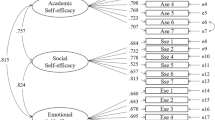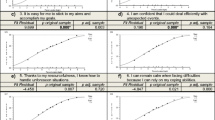Abstract
The current study examined the reliability and validity of the Self-Efficacy Questionnaire for Children (SEQ-C) in a sample of young adolescents (N = 330). Factor analysis of the SEQ-C revealed three factors that were in keeping with the intended subscales: social self-efficacy, academic self-efficacy, and emotional self-efficacy. Furthermore, results showed that the SEQ-C has satisfactory internal consistency. Finally, SEQ-C scores correlated in a theoretically meaningful way with a measure of depression. That is, the lower children's SEQ-C scores, the higher their level of depression. Possible applications of the SEQ-C are briefly discussed.
Similar content being viewed by others
REFERENCES
Bandura, A. (1997). Self-efficacy: The exercise of control. New York: Freeman.
Bandura, A., Pastorelli, C., Barbaranelli, C., & Caprara, G. V. (1999). Self-efficacy pathways to childhood depression. Journal of Personality and Social Psychology, 76, 258–269.
Bernstein, G. A., Borchardt, C. M., & Perwien, A. M. (1996). Anxiety disorders in children and adolescents: A review of the past 10 years. Journal of the American Academy of Child and Adolescent Psychiatry, 35, 1110–1119.
Birmaher, B., Ryan, N. D., Williamson, D. E., Brent, D. A., Kaufman, J., Dahl, R. E., Perel, J., & Nelson, B. (1996). Childhood and adolescent depression: A review of the past 10 years. Part I. Journal of the American Academy of Child and Adolescent Psychiatry, 35, 1427–1439.
Comunian, A. L. (1989). Some characteristics of relations among depression, anxiety, and self-efficacy. Perceptual and Motor Skills, 69, 755–764.
Connoly, J. (1989). Social self-efficacy in adolescence: Relations with self-concept, social adjustment, and mental health. Canadian Journal of Behavioural Science, 21, 258–269.
Ehrenberg, M. F., Cox, D. N., & Koopman, R. F. (1991). The relationship between self-efficacy and depression in adolescents. Adolescence, 26, 361–374.
Havermans, T., & Eiser, C. (1991). Locus of control and efficacy in healthy children and those with diabetes. Psychology and Health, 5, 297–306.
Junge, M. E., & Dretzke, B. J. (1995). Mathematical self-efficacy gender differences in gifted/talented adolescents. Gifted Child Quarterly, 39, 22–28.
Kendall, P. C. (1994).Treating anxiety disorders in children:Acontrolled trial. Journal of Consulting and Clinical Psychology, 62, 100–110.
Kovacs, M. (1981). Rating scales to assess depression in school-aged children. Acta Paedopsychiatrica, 46, 305–315.
Lawrance, L., & Rubinson, L. (1986). Self-efficacy as a predictor of smoking behavior in young adolescents. Addictive Behaviors, 11, 367–382.
Lewinsohn, P. M., Clarke, G. N., Hops, H., & Andrews, J. (1990). Cognitive-behavioral group treatment of depression in adolescents. Behavior Therapy, 21, 385–401.
Nolen-Hoeksema, S. (1998). Ruminative coping with depression. In J. Heckhausen et al. (Eds.), Motivation and self-regulation across the life span (pp. 237–256). NewYork: Cambridge University Press.
Ptacek, J. T., Smith, R. E., & Zanas, J. (1992). Gender, appraisal, and coping: A longitudinal analysis. Journal of Personality, 60, 747–770.
Author information
Authors and Affiliations
Rights and permissions
About this article
Cite this article
Muris, P. A Brief Questionnaire for Measuring Self-Efficacy in Youths. Journal of Psychopathology and Behavioral Assessment 23, 145–149 (2001). https://doi.org/10.1023/A:1010961119608
Issue Date:
DOI: https://doi.org/10.1023/A:1010961119608




